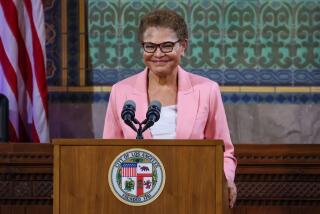L.A. Told Again: Fix Owens River
A state Court of Appeal panel late Wednesday gave Los Angeles a strong push to move ahead on restoring a 62-mile stretch of the Lower Owens River by upholding a court order that would ban the city from using a key aqueduct if it continues delaying the project.
The ruling in the years-long legal dispute was hailed as a victory for Owens Valley residents, environmental groups and state officials fed up with the city Department of Water and Power’s failure to comply with a legal agreement to restore the once-vibrant Inyo County river. The restoration effort would be one of the largest ever attempted in the country.
“This may be the final salvo in the longest-running fight over an environmental impact report in California history,” said Gordon Burns, deputy solicitor general for Atty. Gen. Bill Lockyer. “Now, everybody is holding tight and hoping the city will do what it is supposed to do.”
Laurens H. Silver, a lawyer for the Sierra Club, one of the plaintiffs in the case, said the Lower Owens River Project “should have been implemented four or five years ago, and is mitigation for the long-term damage that the city has done by way of its ground water pumping” from the Owens Valley.
The ruling has implications for the river as well as Owens Lake, which “was almost totally dewatered by the city’s exports” of water from the area, he said.
The Court of Appeal upheld, on narrow grounds, last year’s ruling imposing sanctions against Los Angeles. It said the city and the DWP forfeited their ability to appeal “by failing to object or request modifications” earlier, in trial court.
Specifically, the city did not object when the trial court announced its intended ruling from the bench, did not request a continuance to file a supplemental brief and did not file a motion for reconsideration, the appellate court said.
It also rejected the city’s assertion that raising an objection at the trial court level would have been futile. “In fact, the trial court appeared to invite input on the appropriateness of the sanctions,” the ruling declared.
At the same time, the ruling rejected a bid by the Sierra Club and the Owens Valley Committee to find that the city’s appeal was frivolous and to award them legal fees, costs and damages. “This case does not meet the highly egregious standard that would justify the imposition of sanctions,” ruled a 4th Appellate District panel based in Riverside.
Jonathan Diamond, spokesman for City Atty. Rocky Delgadillo, said it was unclear whether Los Angeles will appeal Wednesday’s ruling.
“We have to look at it and consider the options,” he said.
Diamond, who said he had not seen the appellate decision, said he believes the city has been “in compliance with the order to this point and anticipate that we’ll be in compliance by the 2007 deadline” to begin providing water to replenish the Lower Owens River.
As it stands, the DWP has missed at least 13 deadlines connected to the project due to circumstances that agency officials have insisted were beyond their control. Officials with the agency and representatives of Mayor Antonio Villaraigosa’s administration were unavailable for comment Wednesday.
A year ago, in an attempt to compel the DWP to act, Inyo County Superior Court Judge Lee E. Cooper imposed fines of $5,000 a day until water is flowing again in the river at a rate of 40 cubic feet a second. The fines began accruing Sept. 5, 2005.
Cooper also ordered the DWP to cut by a third its pumping of water out of the lower Owens Valley. Failure to abide by his ruling, he warned, would result in a permanent ban against using the so-called Second Los Angeles Aqueduct, an $89-million facility that has been exporting millions of gallons of water to Southern California each day for domestic use since 1970.
The Lower Owens River Project was conceived in 1991 to mitigate excessive groundwater pumping by the DWP that had destroyed habitat in the Owens Valley from 1970 to 1990. In a legal agreement, the DWP agreed in 1997 to recharge the aquifer and create and sustain healthy and diverse habitat for fish, waterfowl and shorebirds, as well as stands of cottonwood and willows, by mid-2003.
But in 2001, a lawsuit was brought by the California Department of Fish and Game, California State Lands Commission, Sierra Club and Owens Valley Committee, accusing the DWP of deliberately missing deadlines for implementing the project, which would cost about $39 million to get underway.
The legal dispute underlines acrimony that has boiled in the Owens Valley since the early 1900s, when the city had agents pose as farmers and ranchers to buy land and water rights in the valley, then began building an aqueduct to slake the thirst of the growing metropolis more than 200 miles to the south. The river was reduced to a trickle in 1913 when the Owens River Aqueduct began delivering water to Los Angeles.
The Second Los Angeles Aqueduct, which begins south of the Owens dry lakebed and ends 200 miles to the south in the San Fernando Valley, added 50% more capacity to the water system when it was opened 36 years ago.
The aqueducts dried up Owens Lake, drained the natural springs that fed fish hatcheries and farmlands, and helped turn the region into a dustbowl. For Owens Valley residents, the delay in reviving the river has been characterized as a dereliction of duty by the city.
The two Los Angeles aqueducts deliver about 430 million gallons a day to the city.
In previous long legal battles in the eastern Sierra, the DWP has been forced to give up significant amounts of water to steady water levels in Mono Lake, and to re-water parts of the dry Owens Lake to prevent dust storms.
stuart.silverstein@latimes.com
More to Read
Start your day right
Sign up for Essential California for news, features and recommendations from the L.A. Times and beyond in your inbox six days a week.
You may occasionally receive promotional content from the Los Angeles Times.







